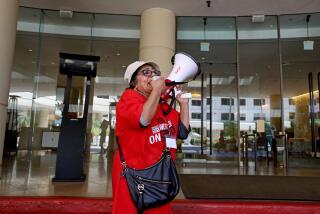What’s the Deal With Hilton’s CEO?
- Share via
Stephen F. Bollenbach, Hilton Hotels Corp.’s chief executive, loves the deal.
He worked with Donald Trump -- “I was the original Apprentice,” Bollenbach jokes -- negotiating debt-for-equity swaps with creditors in the early 1990s. Then, at Marriott International Inc., he engineered a financing strategy to split the company in two. After joining Walt Disney Co. in 1995, he orchestrated its acquisition of the ABC network.
Now, with Hilton looking to deploy the $1 billion in excess cash that it’s expected to generate over the next three years, Wall Street is wondering what Bollenbach will do.
He has said he plans to retire in three years at age 65. But will there be one last hurrah, a major acquisition or even the sale of the company?
“That’s what people are waiting for,” said Rod Petrick, a managing director and analyst with Legg Mason Wood Walker Inc., a Baltimore-based securities firm. “Steve has a reputation of being a deal guy. Now they are waiting for the coup de grace.”
Bollenbach, who this year became the first non-family member to share the chairmanship of the Beverly Hills-based company founded by Conrad Hilton, may well disappoint them: His preference is to return the bulk of the $1 billion to shareholders in a stock buyback.
“I don’t believe that we need to buy any new hotels, build any new hotels or buy any other companies,” he said in an interview. “I think we have everything we need within our company.”
That company, which Bollenbach described as “diversified in terms of ownership, diversified in terms of business purpose,” is much changed since he showed up eight years ago. In one of his signature deals, Bollenbach in 1998 spun off Hilton’s gaming operations in a $1.2-billion deal that created what became Caesars Entertainment Inc.
No longer dependent on gambling and a few major hotels, Hilton today owns only 52 properties but franchises or manages more than 2,000, including the Embassy Suites, Hilton Garden Inns and Doubletree hotel chains. It now gets nearly 40% of its revenue from franchising and managing.
In another switch, Hilton time-share properties in Hawaii, Orlando and Las Vegas -- a business the company was barely in when Bollenbach arrived -- now bring in nearly 10% of total revenue. And Hilton is in big-time expansion mode, with 425 hotels, comprising 58,000 rooms, in the development pipeline. According to analysts, Hilton recently replaced Marriott as the company with the most rooms under development.
And it is profitable this year, after at least six quarters in the doldrums after the 9/11 terrorist attacks, which were devastating to the travel industry. Most recently, Hilton’s earnings jumped 79% to $61 million in the three months ended Sept. 30.
“Everything that could go wrong did in the past three years, and now they’ve come out of it cleanly,” said Patricia Wright, lodging industry analyst with Fitch Ratings, which has just upgraded Hilton’s debt to investment grade. “They’ve fortified their balance sheet.”
Hilton’s stock is up 20% this year, far outstripping the 5.3% gain in the benchmark Standard & Poor’s 500 index. Still, Hilton’s year-to-date performance lags behind the 26.8% gain in the S&P; index of four major hotel stocks.
Running the company has been profitable for Bollenbach. His pay package -- mostly stock options -- was about $23 million last year, and just this month he exercised other stock options that would add about $20 million to his 2004 compensation.
Ken Moelis, global head of investment banking for UBS Warburg, has known and worked on deals with Bollenbach for 20 years. Moelis called him one of the few CEOs consistently focused on shareholder value.
“Steve will do what is in the best interest of shareholders,” Moelis said.
Some on Wall Street can’t believe Bollenbach doesn’t have ambitions grander than a routine buyback. Among the other options: upgrade the 52 hotels Hilton owns; expand the company’s time-share business; buy a competing hotel chain; or sell Hilton to the highest bidder.
Snapping up a smaller rival would suit the CEO’s style -- in 1999 he doubled Hilton’s size by acquiring Promus Hotel Corp. for $4 billion. Reto Wittwer, chief executive of Kempinski Hotels & Resorts, a German luxury chain that manages 39 hotels, said recently that the company rejected a buyout offer from Hilton last year. A Hilton spokesman said he couldn’t comment.
For now, Hilton is using its extra cash to improve existing hotels, such as the flagship Waldorf-Astoria in New York, a portion of which received a $15-million makeover. The company is shedding other properties, recently hiring a broker for a possible sale of the Palmer House Hilton, Chicago’s oldest and second-largest hotel.
One deal that Bollenbach believes will eventually occur is with Hilton Group, a British company that operates more than 400 mostly European hotels and has a major gaming business. Once known for their fractious relationship, the two companies now have several joint sales, marketing and customer-loyalty programs.
A merger or acquisition involving its British cousin would make Hilton a truly global company, like competitors Marriott and Starwood Hotels & Resorts Worldwide Inc. But even though Bollenbach believes that now is not the time for such a combination, analysts said it would make sense at some point.
“When you are competing on a world stage, you can talk all you want about alliances and joint ventures,” said analyst Petrick, “but at some point you want to say you are a world player.”
More to Read
Inside the business of entertainment
The Wide Shot brings you news, analysis and insights on everything from streaming wars to production — and what it all means for the future.
You may occasionally receive promotional content from the Los Angeles Times.









